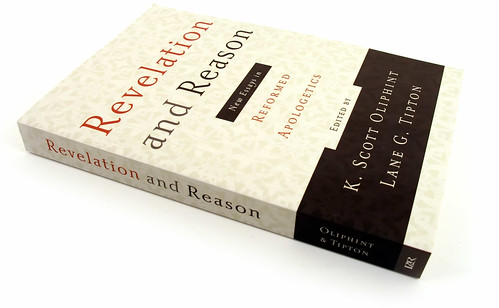From The Shepherd's Scrapbook @ http://spurgeon.wordpress.com
 Unbelief is Irrational
Unbelief is Irrational
It’s not uncommon today for atheists to rise to their pulpits and boldly preach that belief in some god (let alone a specific god) is simply irrational. Dr. K. Scott Oliphant, professor of apologetics and systematic theology at Westminster Seminary, disagrees. In a recently published essay he points to Paul’s words in the first chapter of Romans to make his case that unbelief is irrational.
Oliphant’s proposition is this: Unbelief is irrational because, at its core, all sin is irrational. He argues, “Sin is essentially, and will remain, deeply unreasonable, utterly irrational … Given that unbelief is at root the quintessential sin, it is therefore, necessarily, quintessentially irrational” (pp. 59-60). He backs up this proposition exegetically from Romans 1:18-32.
Oliphant begins by pointing to Paul’s emphasis in Romans that all people are covenantally bound to Adam or to Christ, walking under condemnation or justification (Rom. 5:12-21). The first two chapters of Romans are devoted to revealing God’s wrath upon those in Adam. Specifically, God’s wrath is kindled against sinners who “suppress the truth” (1:18).
The act of suppressing divine truth is sinful or “unrighteousness” (1:18). So sin is by nature the suppressing of truth. “In other words, God’s wrath is revealed from heaven because, in our wickedness and unrighteousness (in Adam), we hold down (in our souls) that which we know to be the case” (p. 64)
So what knowledge is suppressed? Paul tells us we suppress the universal truths about God — that He exists, He is infinite, eternal, wise, unchanging, glorious and wise. Far from being a mere intellectual knowledge of God, there is included in this a very personal knowledge of God communicated from His Person to our person. So personal that Paul can write, “they know God’s decree that those who practice such things [sins] deserve to die” (Rom. 1:32). Every sinner that suppresses God’s truth and lives on in sin knows that sin is rightfully punished with death. But this and all truth about God is suppressed. The point is clear: God has spoken so openly and so clearly that every sinner knows these universal truths.
How do sinners suppress divine truth? By exchange. We take the glory of our great God and Creator and exchange His glory for superficial images of reality. The next step is to worship and serve the phantoms of reality we create. The truth of the created order becomes twisted into what we think is right. There is an exchange of the natural for the unnatural, like in the case of homosexual relationships (Rom. 1:26-27). Oliphant writes, “All of us, in Adam, are experts in inventing idols” and later he writes “we only retain that [knowledge] which will serve our own idolatrous purposes” (p. 69, 70). Paul tells us this idolatry – worshiping a false reality — is at the center of unbelief.
Paul then goes on to list all sorts of sins, not just homosexuality, but also unrighteousness, evil, covetousness, envy, murder, strife, deceit, maliciousness, gossip, slander, hatred of God, insolence, haughtiness, boastfulness, inventors of evil, disobedient to parents, foolish, faithless, heartless, ruthless (Rom. 1:29-31). Oliphant writes, “All sin, as sin, is rooted in an irrationality that seeks in earnest to deny what is obvious and to create a world that is nothing more than a figment of a sinful imagination” (p. 72).
The sad reality is that for those outside God’s sovereign election, this personal knowledge of God will be drowned out by the noise and passions of the sinful heart. The witness of God’s existence in the heart becomes futile knowledge to an irrational mind. God reveals Himself all around, and blind sinners in Adam respond by suppressing this truth and living in a phantom irrationality.
Conclusion
Paul paints a humbling portrait of all unredeemed sinners. We did not learn Christ because we were more perceptive or less sinfully irrational. God alone opened our eyes. Oliphant says, “The truth that we know – that we retain, possess, and suppress – therefore, is truth that is, fundamentally and essentially, given by God to us. God is the one who ensures that this truth will get through to us. It is his action, not ours, that guarantees our possession of this truth” (p. 66).
This first chapter of Romans is useful to remind believers of our personal sin and irrationality. We are still tempted to live at the feet of a phantom shrine forged in our minds rather than live within reality. And rather than scoffing at the unbeliever, we can look at our own hearts and see where we — as seasoned idolaters! – continue to suppress truth and twist reality in favor of escapism, fantasy and worldly comforts.
But also armed with Paul’s teaching in Romans and brought under the humility of dead sinners raised to life by the power of God, we are prepared to think through apologetics, preaching and personal evangelism. All of our hearers have heard a personal message from a personal God and we are all without excuse (Rom. 1:20). Apparently evidence does not demand a verdict from irrational minds.
Understanding this awful irrationality of the sinful mind will cause us to once again pray like Spurgeon:
“‘Rise up, Lord!’ O God the Father, rise up! Pluck Thy right hand out of Thy bosom, and let Three eternal purposes be accomplished! O God the Son, rise up; show Thy wounds, and plead before Thy Father’s face, and let Thy blood-bought ones be saved! Rise up, O God the Holy Ghost; with solemn reverence, we do invoke Thine aid! Let those who have hitherto resisted Thee, now give way! Come Thou, and melt the ice; dissolve the granite: break the adamantine heart; cut Thou the iron sinew, and bow Thou the stiff neck!”
————
[This exegesis of Romans 1 can be found between pages 59-73 of P&R’s latest release edited by Oliphant and Lane G. Tipton titled, Revelation and Reason: New Essays in Reformed Apologetics (Philipsburg, NJ: P&R) 2007.]

No comments:
Post a Comment